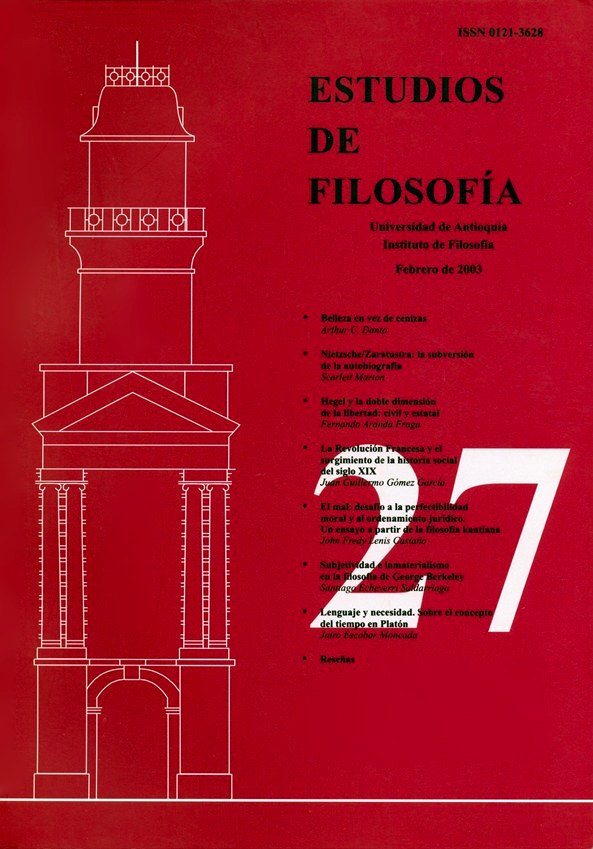Subjetividad e inmaterialismo en la filosofía de George Berkeley
DOI:
https://doi.org/10.17533/udea.ef.14894Palabras clave:
Berkeley (Crítica e Interpretación), empirismo británico, materia (filosofía), subjetividadResumen
Con frecuencia, el inmaterialismo de Berkeley ha sido mal comprendido, pese al importante papel que cumple dentro de su filosofía. Dos razones podrían explicar este hecho: de un lado, se ha juzgado que la negación de la existencia de la materia contradice radicalmente el sentido común; de otro lado, se podría pensar que la tesis del inmaterialismo obedece exclusivamente a las motivaciones teológicas que impulsaron las indagaciones de Berkeley. En contraste con estas posturas, el artículo propone hacer una lectura estrictamente filosófica de la negación berkeleyana de la materia, e intenta presentar críticamente los argumentos que le sirven de apoyo. Dicho examen conduce a un análisis de la relación que establece el inmaterialismo de Berkeley con su concepción de la subjetividad. En primer término, el autor se distancia del inmaterialismo sostenido por el filósofo irlandés, pues el argumento central que este último emplea para negar la existencia de la materia se apoya en una interpretación muy cuestionable de la mente. En segundo término, el autor propone valorar históricamente el inmaterialismo de Berkeley como una postura sobre la subjetividad más consistente que la ofrecida por sus predecesores inmediatos: Descartes y Locke.
Descargas
Citas
BENNETT, J. (1989): Locke. Berkeley, Hume: Central Themes. Oxford: Clarendon Press.
BERKELEY, G (1969): Berkeley's Philosophical Writings. London: Collier Books.
_____________ (1978): Tres Diálogos entre Hilas y Filonús. Buenos Aires: Aguilar.
_____________ (1992): Tratado sobre los principios del conocimiento humano. Madrid: Alianza.
BORGES, J. L. (1983): Tiön, Uqbar, Orbis Tertius, en: BORGES, J. L.; OCAMPO, S.; BIOY CASARES, A. Antología de la Literatura fantástica. Barcelona: Edhasa.
BRACKEN, H. M. (1965): The Early Reception of Berkeley's lmmaterialism 1710-1733. The Hague: Martinus Nijhoff. DOI: https://doi.org/10.1007/978-94-010-3567-5
CASSIRER, E. (1994): La filosofía de la Ilustración. Bogotá: FCE.
ECHEVERRI, S. (2001): La existencia del mundo exterior. Un estudio sobre la refutación kantiana del idealismo. Medellin: Universidad de Antioquia.
HUME, D. (1992): Investigación sobre el entendimiento humano. Bogotá: Norma. KANT, 1.(1998): Kritik der reinen Vernunft. Hamburg: Felix Meiner Verlag.
LOCKE, J. (1994): Ensayo sobre el Entendimiento humano. Bogotá: FCE.
LUCE, A. A. (1988): Berkeley’s Existence in the Mind, en: MARTIN, C. B. et. al. ARMSTRONG D. M. Berkeley: A Collection of Critical Essays. New York & London: Garland Publishing.
MACH, E. (1993): La ciencia de la mecánica, en: EINSTEIN, A. et. al. Otros. La teoría de la relatividad: Sus orígenes e impacto sobre el pensamiento moderno. Barcelona: Altaya.
PIERCE, Ch. S. (1988): El hombre, un signo (El pragmatismo de Peirce). Primera Parte. U. Las obras de George Berkeley. Barcelona: Critica.
PITCHER, G (1983): Berkeley. México: FCE.
POPPER, K. R. (1968): A Note on Berkeley as Precursor of Mach and Einstein, en: POPPER, K. K. Conjectures and Refutations. The Growth of Scientific Knowledge, p. 166-175. New York and Evanston: Harper & Row Publishers. DOI: https://doi.org/10.1007/978-1-349-15284-1_23
RANDALL,A. F. (1996): The Rejection of Abstract Ideas in the Metaphysics of George Berkeley. Toronto: http://home.ican. net/--arandall/Berkelev/.
REALE, G. et. al. ANTISERI, D. (1988): Historia del Pensamiento filosófico y científico. Barcelona: Herder.
THORNTON, S. ( 1987): Berkeley’s Theory of Reality. http://www.ul.ie/~Dhilos/berkel.html.
TURBAYNE, C. M. (1969): Kant’s Relation to Berkeley, en: BECK, L. W. Kant Studies Today. Open Court: La Salle; Illinois.
Descargas
Publicado
Cómo citar
Número
Sección
Categorías
Licencia
Derechos de autor 2003 Estudios de Filosofía

Esta obra está bajo una licencia internacional Creative Commons Atribución-NoComercial-CompartirIgual 4.0.
Los autores que publican en Estudios de Filosofía acuerdan los siguientes términos:
1. El Autor retiene el copyright del "Artículo", por el cual se entiende todos los objetos digitales que pueden resultar de la subsiguiente publicación o distribución electrónica.
2. En conformidad con los términos de este acuerdo, el autor garantizará a Estudios de Filosofía como Editor el derecho de la primera publicación del artículo.
3. El Autor le concederá al Editor un derecho perpetuo y no-exclusivo, así como una licencia de la misma clase, de publicar, archivar y hacer accesible el Artículo parcial o totalmente en todos los medios conocidos o por conocerse, derecho y licencia que se conocen como Creative Commons License Deed. Atribución-No Comercial- Compartir igual CC BY-NC-SA o su equivalente que para efectos de eliminar toda duda, le permite a otros copiar, distribuir, y transmitir el Artículo bajo las siguientes condiciones: (a) Atribución: Se deben reconocer los créditos de la obra de la manera especificada por el Autor a Estudios de Filosofía, pero no de una manera que sugiera que tiene su apoyo o que apoyan el uso que hace de su obra. (b) No Comercial: No se puede utilizar el Artículo para fines comerciales.
4. El Autor puede realizar otros acuerdos contractuales no comerciales para la distribución no exclusiva de la versión publicada del Artículo (v. gr. ponerlo en un repositorio institucional o publicarlo en un libro) con la condición de que haga el debido reconocimiento de su publicación original en Estudios de Filosofía.
5. A los Autores se les permite y Estudios de Filosofía promueve publicar en línea (online) la versión pre-impresa del Artículo en repositorios institucionales o en sus páginas web, antes y durante la publicación, por cuanto que puede producir intercambios académicos productivos, así como una mayor citación del Artículo publicado (ver The Effect of Open Access). Dicha publicación durante el proceso de producción y en la publicación del Artículo se espera que se actualice al momento de salir la versión final, incluyendo una referencia a la URL de Estudios de Filosofía.















